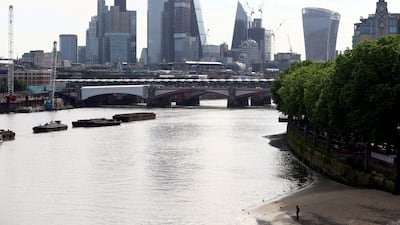Scrapping the non-dom status could cost the UK economy £6.5 billion by 2035, a think tank has warned.
More than 23,000 jobs could also be lost due to the departure of tens of thousands of non-doms, according to the report by the Adam Smith Institute.
It estimates that almost a quarter, or 5,800 of the country’s 22,100 “remittance basis non-doms” – wealthy foreigners living in the UK who register their permanent home overseas and only pay tax on income or gains they bring to Britain – could leave over time as a result of Labour’s planned reforms.
Their loss would result in significant economic damage to the UK, including capital flight, brain drain and reduced investment of £500 million per year – causing the UK's GDP to shrink by £6.5 billion by 2035, with the overall economy worth an estimated £2.7 trillion.
“We'll see about 23,000 jobs lost from that, from the lack of money going into the consumer economy,” the report’s co-author Maxwell Marlow told The National.
“They'll spend less on private education. They're going to sell their houses, so their mortgages are going to go and they're also not going to the theatre or buy nice cars.”
Under Labour’s proposed changes, toughening up rules brought forward by Chancellor Rachel Reeves' Conservative predecessor Jeremy Hunt, the non-dom status would be scrapped and replaced by a residency-based regime that applies to both foreign income and gains, introducing inheritance tax on their assets starting from April 2025.
That means all assets held overseas by wealthy foreign nationals who have been UK resident for more than 10 years will be subject to British inheritance tax rules and can remain so for up to 10 years after they leave Britain.
Treasury officials have reportedly warned the Chancellor's plan could backfire dramatically due to the number of super-rich who are predicted to leave. Ms Reeves is reportedly considering softening the proposals as a result.

The Adam Smith report suggests the introduction of a flat tax regime that would see non-doms paying fixed annual fees instead could stem the tide and raise money for the government.
Charging non-doms £150,000 each, while exempting them from inheritance tax, could instead raise £12.45 billion a year in tax revenue, while attracting more non-doms to Britain, it claims.
“We have shown in the research that when Italy did this, they saw 25 per cent of their millionaires return to the country from abroad, and they got more people in. So we think a much more simple system, like the tiered system, would be very, very attractive.
“I have spoken to some non-doms who are looking to move abroad and they said, yes, that would be quite optimal.”
However, the plan has been questioned by some. Arun Advani, associate professor at the University of Warwick, told The National other research showed “the sums just don't add up”.
“Currently less than 2,500 people are willing to pay £30-60k to access the regime, so you'd need all of them to be willing to pay £5 million a year to reach £12.5 billion,” he said. The “vast majority” of non-doms are working in high-paying jobs in the UK, and do not hold significant wealth overseas, so a flat tax of £150,000 “wouldn't help them at all”.
“It does seem odd to use the highest possible estimated migration response from a summary of the empirical literature, rather than either the typical response there, or even better the evidence we have for this specific group from the UK,” he added.
A similar scheme was recently proposed by the Foreign Investors for Britain group, which revealed earlier this week that non-doms are already pulling hundreds of millions of pounds in assets from Britain ahead of the raid.
Under its plan, non-doms would pay an annual charge based on their net wealth, which would be £200,000 for those with wealth under £100 million; £500,000 for those between £100 million and £250 million; £1 million for those between £250 million and £500 million; and £2 million for those with wealth over £500 million.
Just 13 per cent of non-doms would leave the UK if this was in place, while 73 per cent would stay longer than previously planned, according to research by Oxford Economics.


